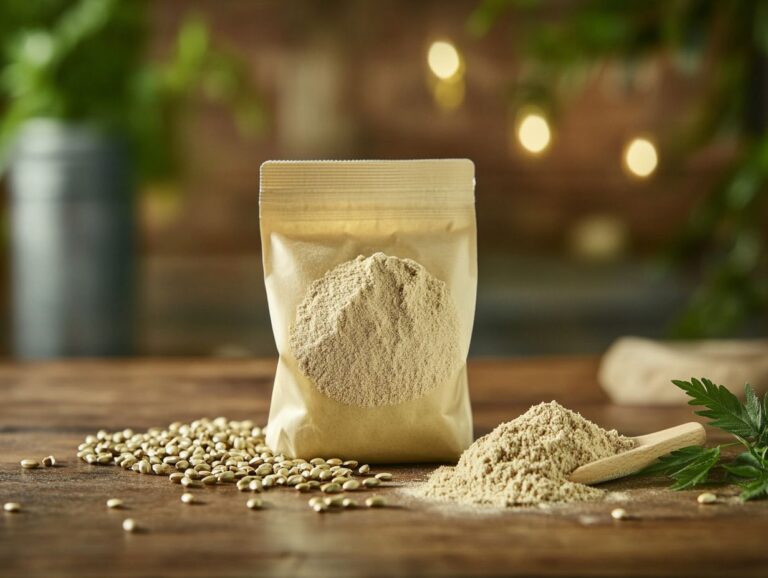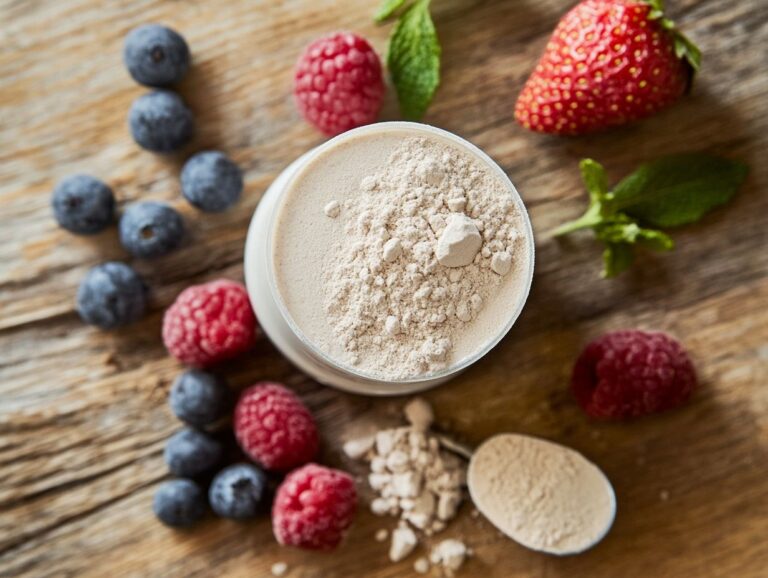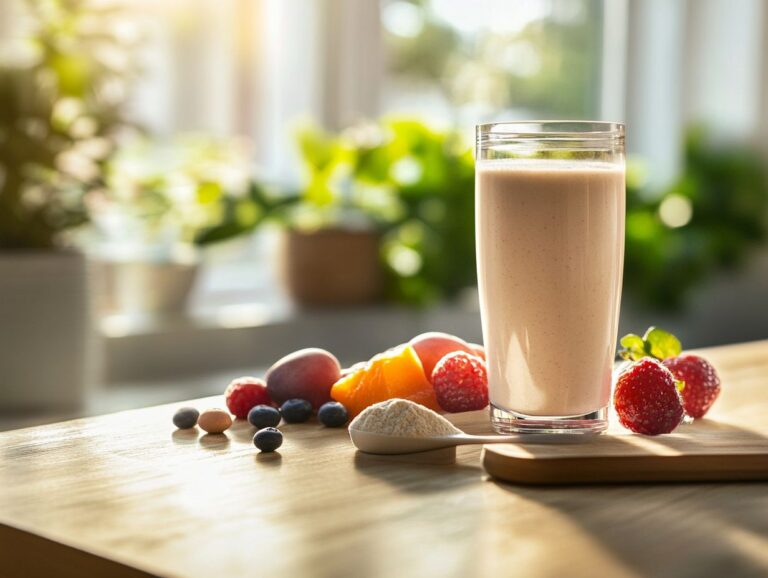Naked Pea Protein is a nutritious and versatile dietary supplement that is becoming increasingly popular, particularly among health-conscious individuals and those seeking a nutrient boost adhering to vegan or vegetarian diets, such as athletes and fitness enthusiasts. This plant-based protein powder, often highlighted in sports nutrition is rich in protein and essential amino acids, including branched-chain amino acids, offering numerous benefits that make it an excellent choice for anyone looking to boost their protein intake. This article explores what Naked Pea Protein is, how it is produced, and its potential side effects, along with a comparison to other protein powders and their ingredient list, such as Garden of Life and Vega. Additionally, it will provide tips for incorporating Naked Pea Protein into your diet and recommendations for those who may benefit most from it.A vegan protein like Naked Pea Protein serves as an excellent option.
What Is Naked Pea Protein?
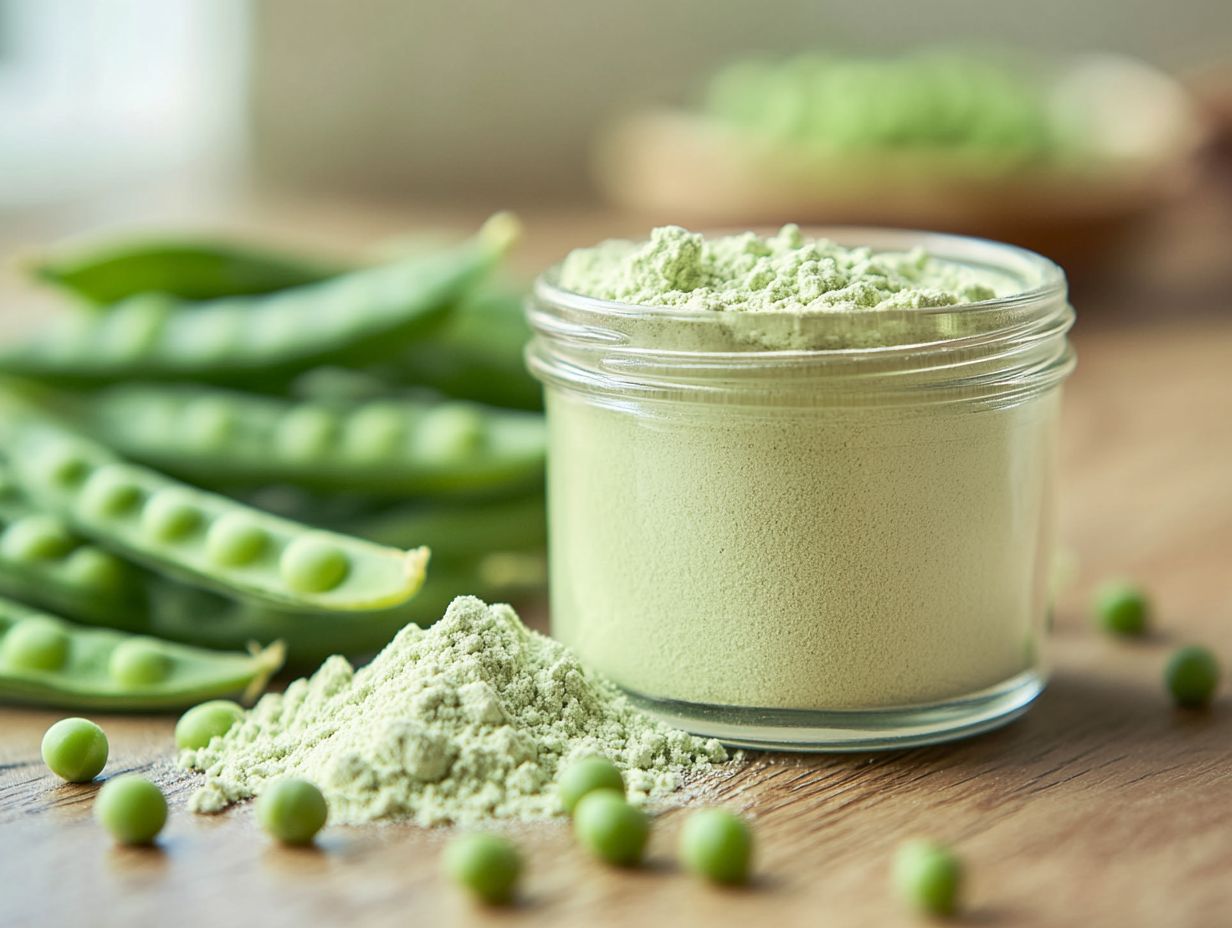
Naked Pea Protein is a highly nutritious, plant-based protein powder derived from yellow split peas. It offers a complete source of protein, making it ideal for individuals with various dietary restrictions, including vegans, vegetarians, and those managing food sensitivities, such as lactose intolerance or gluten sensitivity.
This product is specifically designed to meet the protein needs of active individuals, athletes, and lactating or pregnant women, making it a versatile option for meal supplementation and workout recovery.
Naked Pea Protein emphasizes high-quality ingredients that align with rigorous nutritional specifications and guarantees independent verification of its nutritional integrity.
What Are the Benefits of Naked Pea Protein?
Naked Pea Protein offers numerous health benefits, making it one of the most popular protein powders available.
As a rich source of complete proteins, it effectively supports muscle repair and recovery following strenuous workouts, thus filling nutritional gaps. Additionally, its versatility makes it an excellent protein option for individuals following a vegan or vegetarian diet.
1. High in Protein
Naked Pea Protein has a high protein content, providing a significant amount of protein per serving, making it an excellent choice for those looking to increase their protein intake.
Each serving contains a substantial amount of complete proteins, which are essential for muscle growth and repair, benefiting athletes and fitness enthusiasts alike.
When comparing its protein concentration to other sources, Naked Pea Protein offers a plant-based alternative that matches the efficacy of whey or casein, surpassing taste texture expectations, without the lactose or allergens associated with dairy proteins. This characteristic makes it ideal for individuals following a vegan diet or those with sensitivities.
For populations with increased protein needs, such as bodybuilders or patients recovering from surgery, incorporating Naked Pea Protein into their diet can help them achieve their protein intake goals.
The recommended dosage typically ranges from one to two servings per day, but consultation with a healthcare professional or registered dietitian is advised, based on advice from healthcare professionals, which can easily be added to smoothies or protein shakes, ensuring maximum benefits for muscle synthesis and recovery, catering to protein intake needs for different demographics.
2. Rich in Essential Amino Acids
The most significant feature of Naked Pea Protein is its high concentration of essential amino acids, including branched-chain amino acids (BCAAs). These amino acids are crucial for muscle repair and recovery after physical exertion, making Naked Pea Protein an ideal protein source for those who are physically active and individuals with specific dietary needs.
They play an important role in overall health by helping to maintain lean body mass, endurance, and recovery from physical activities. BCAAs found in this plant-based protein offer a natural alternative for athletes seeking optimal performance without relying on dairy or animal products.
Recent nutritional studies emphasize that a balanced intake of amino acids is vital for both athletes and individuals looking to enhance their diets. Naked Pea Protein delivers a high-quality protein source that aligns with modern dietary requirements and health goals.
3. Easily Digestible
Naked Pea Protein is highly digestible and often contains a digestive enzyme blend, making it an excellent choice for individuals with food sensitivities or those who struggle to tolerate other protein powders from a digestive perspective.
Often formulated with digestive enzymes, Naked Pea Protein enhances absorption and simplifies protein consumption. This characteristic sets it apart from other protein sources, such as whey or casein, which can be more challenging to digest for those with lactose intolerance or milk allergies.
For individuals with specific dietary needs, such as vegans or those managing medical conditions like irritable bowel syndrome (IBS), selecting an easily digestible protein source is essential for supporting their overall well-being.
4. Vegan and Vegetarian Friendly
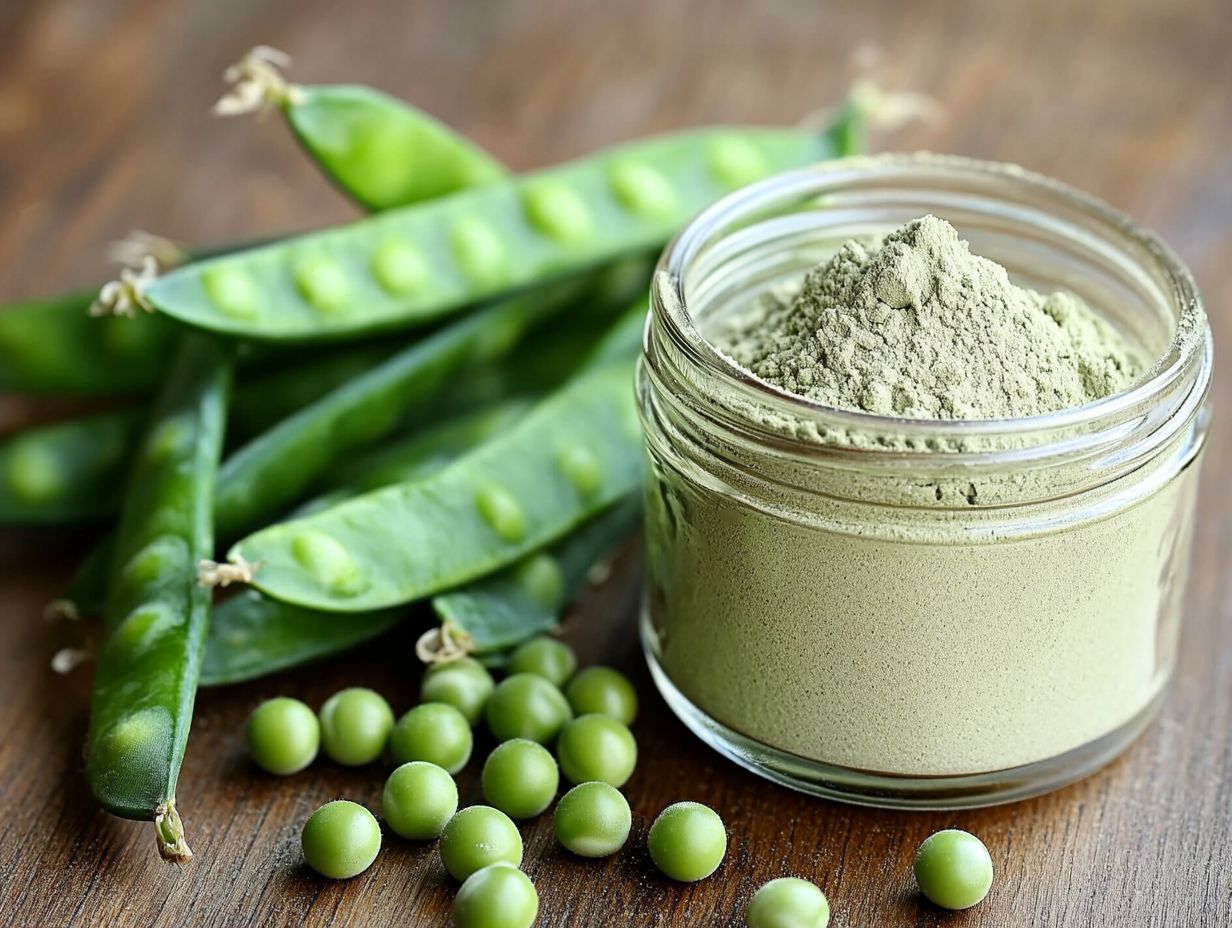
Naked Pea Protein serves as an excellent vegan protein option, offering high-quality, clean plant-based protein that aligns with the needs and values of vegans and vegetarians. Its ingredient profile contains no animal products or common allergens, making it ideal for vegetarian diets and those with dietary restrictions.
Naked Pea Protein effectively meets the protein requirements of individuals looking to increase their protein intake without sacrificing nutritional value. Additionally, this supplement is a sustainable protein source derived from yellow peas, reflecting good product attributes, appealing to those who are conscious of their environmental impact.
Vegan protein sources are essential as they provide a robust amino acid profile necessary for muscle repair and growth. When appropriately incorporated into a meal plan, this product can enhance dietary diversity, making it a great choice for fitness enthusiasts, athletes, and anyone pursuing a healthy lifestyle while adhering to a vegan diet.
5. Free from Common Allergens
Naked Pea Protein is an excellent choice for individuals with dietary restrictions, as it is free from dairy, soy, and gluten, catering to various dietary restrictions. This makes it a safe option for consumers who need to avoid these ingredients, particularly those with food sensitivities.
For many, making food choices can be challenging, and the presence of allergies or intolerances further complicates the process. Naked Pea Protein stands out as a clean, plant-based protein that accommodates various dietary needs without sacrificing nutrition.
Additionally, third-party testing for heavy metals through reputable organizations like Informed Choice offers consumers reassurance about the safety and quality of the product. This level of transparency is crucial in today’s health-conscious landscape, allowing individuals to pursue their nutritional goals without the concern of hidden contaminants.
How Is Naked Pea Protein Made?
The production process of Naked Pea Protein, under Naked Nutrition’s dietary supplement methodology begins with the careful sourcing of high-quality yellow split peas. These peas are processed in a manner that preserves their nutritional integrity, resulting in a dietary supplement that is both effective and versatile, meeting various protein requirements.
This method ensures that the final product complies with FDA standards and features a clean ingredient list, free from unnecessary additives or fillers, making it highly appealing to health-conscious consumers.
What Are the Potential Side Effects of Naked Pea Protein?
The side effects of Naked Pea Protein are minimal, and the product is generally well-tolerated. However, gastrointestinal discomfort and allergic reactions are the most common issues reported.
Understanding the potential side effects of Naked Pea Protein can help consumers make informed decisions about how and whether to incorporate this protein supplement into their diets, particularly for individuals with specific medical conditions.
1. Digestive Discomfort
Naked Pea Protein may cause digestive discomfort in some individuals, which can be alleviated by incorporating digestive enzymes to enhance nutrient absorption. This discomfort is often a result of the body adjusting to increased protein intake or sensitivity to specific ingredients.
The adjustment to higher protein consumption, coupled with irritants such as lactose or artificial sweeteners, can contribute to digestive issues. However, Naked Pea Protein is less likely to irritate the digestive system because it contains no added sugars or unnecessary additives.
To promote optimal digestion, it is important to adhere to the recommended dosage and consider blending options to the recommended dosage, as taking too much at once can overwhelm the digestive system.
Additionally, using suitable blending options—such as mixing the protein with hydrating liquids or fiber-rich fruits—can improve tolerance and absorption, allowing users to enjoy the benefits without experiencing negative side effects.
2. Allergic Reactions
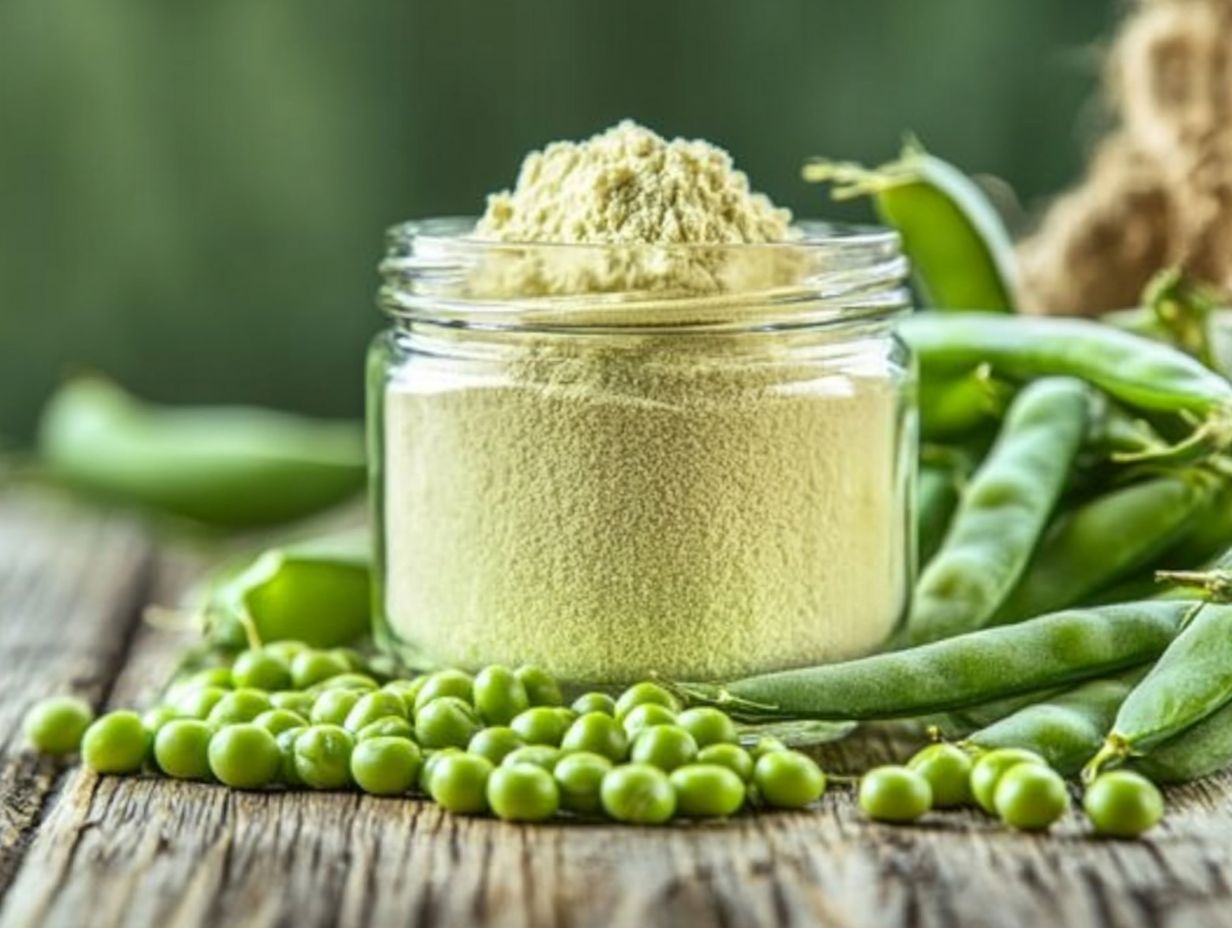
Naked Pea Protein consists solely of pea protein, without common allergens, including gluten and dairy and is not derived from any of the most common allergens. However, it is still possible, albeit rare, for individuals to have allergic reactions to pea protein, particularly if they have specific food sensitivities or underlying medical conditions.
It is important to understand potential allergens beyond the obvious benefits for consumers, as advised by healthcare professionals, and healthcare professionals may be needed to monitor symptoms and other related concerns.
Naked Pea Protein is a plant-based protein that is free from many common allergens, including gluten, dairy, and soy, which significantly reduces the likelihood of adverse reactions.
3. Heavy Metal Contamination
Heavy metal contamination is indeed a concern for many dietary supplements, including protein powders like Naked Pea Protein.
To ensure that their products are safe and free from dangerous levels of heavy metals, manufacturers must conduct proper third-party testing. This type of testing not only confirms the safety of protein powders for consumers but also builds consumer trust in the manufacturer by providing reliable certifications from independent laboratories.
For manufacturers, these certifications serve as a powerful marketing tool. For consumers, they offer reassurance that a product has undergone thorough testing and inspection, which is particularly important for health-conscious individuals. This independent verification is crucial for meeting the FDA thresholds and ensuring that the products are free from heavy metals and other contaminants.
Third-party testing helps maintain the integrity and reputation of products in a competitive market by aligning with FDA thresholds and other nutritional specifications. Ultimately, ensuring safety against heavy metal contamination means that these products are healthier for consumers, including pregnant and lactating women, and those with specific dietary restrictions.
How Does Naked Pea Protein Compare to Other Protein Powders?
Naked Pea Protein is often compared to other protein powders, such as whey protein, soy protein, and brown rice protein, which are popular in sports nutrition. Each type of protein powder has unique characteristics and health benefits, making them suitable for different dietary supplement methods and nutritional needs.
Naked Pea Protein offers a plant-based alternative with a complete amino acid profile, including branched-chain amino acids, making it suitable for individuals with dietary restrictions and those following a vegan diet. It also meets the protein requirements comparable to its non-plant-based counterparts, thereby supporting a vegetarian diet.
1. Whey Protein
Whey protein is well-known for its rapid absorption and high biological value, making it a popular choice among athletes for muscle recovery and workout recovery. However, Naked Pea Protein provides a comparable complete protein source for those who prefer plant-based options and are conscious of protein deficiency.
While whey protein offers benefits such as quick digestion and a rich amino acid profile, making it ideal for post-exercise recovery, Naked Pea Protein is hypoallergenic and easily digestible. Individuals with food sensitivities like dairy sensitivities or lactose intolerance may find plant-based proteins to be a better alternative, as they eliminate issues commonly associated with allergenic ingredients. Consulting a Registered Dietitian or healthcare professional can help assess these needs.
Whey protein tends to meet the needs of those engaged in intensive physical training programs, whereas Naked Pea Protein is often favored by individuals following vegan and vegetarian diets that align with their ethical and health considerations.
The differences in digestibility and dietary inclusion emphasize the importance of considering individual nutritional goals when choosing between these two protein sources.
2. Soy Protein
Soy protein is a widely used plant-based protein powder and serves as a good source of complete proteins. However, Naked Pea Protein is free from common allergens and is less likely to cause digestive issues, making it a preferable choice for many consumers, especially those with specific medical conditions that require careful protein consumption strategies.
While premium quality soy protein offers a complete amino acid profile, it can trigger allergies in some individuals, leading to adverse reactions and discomfort. For those with such sensitivities, Naked Pea Protein is an excellent alternative, as it promotes better digestibility and reduces the likelihood of bloating and other digestive distress often associated with soy products.
Health-conscious consumers value that Naked Pea Protein maintains a high protein content without the unwanted side effects linked to soy, thereby supporting their overall health and wellness goals.
3. Brown Rice Protein
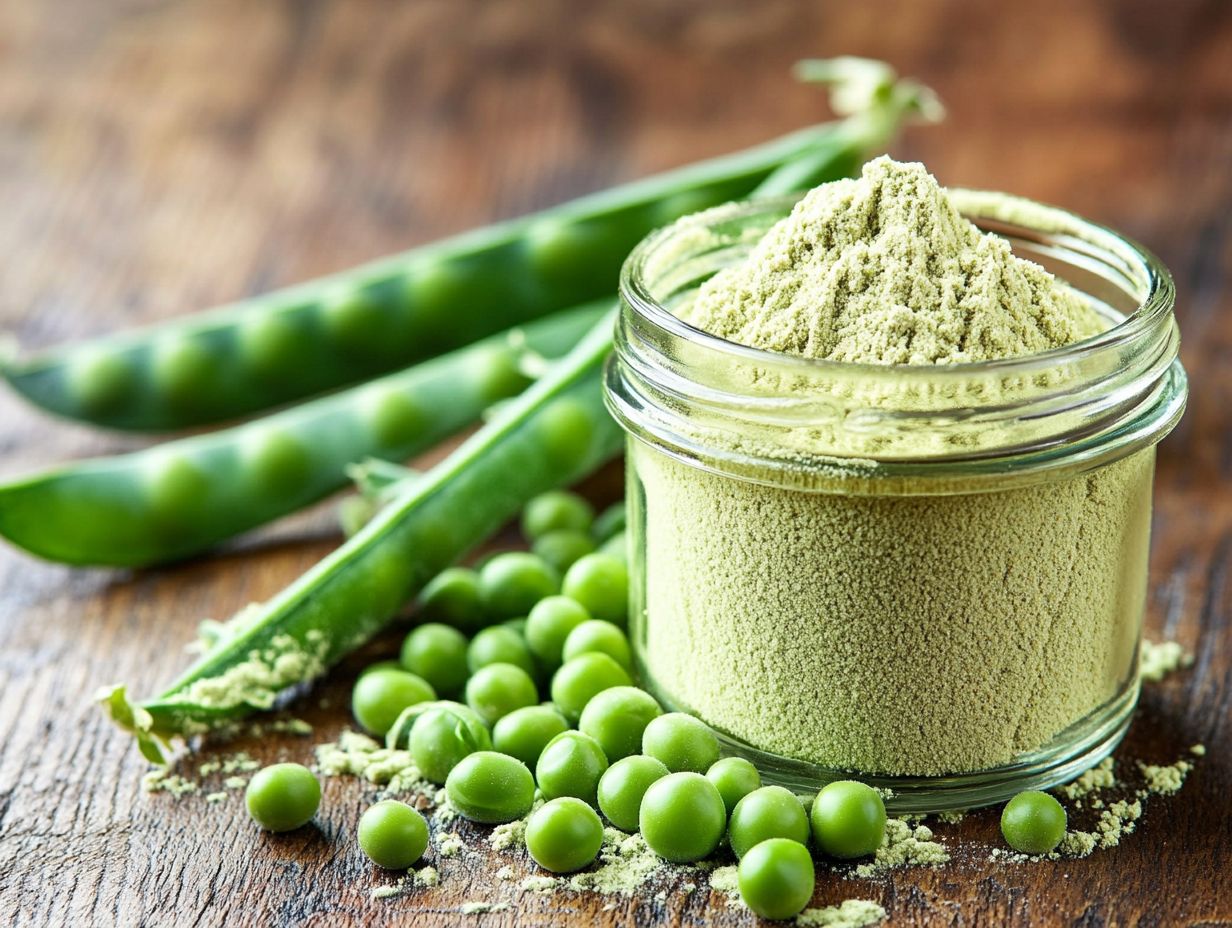
Brown rice protein is frequently combined with other plant proteins to create a complete amino acid profile; however, Naked Pea Protein offers a standalone option that provides similar benefits without the common allergens found in many protein powders.
Both of these protein sources serve unique roles in a balanced diet, especially for individuals following a plant-based lifestyle. Brown rice protein is relatively high in carbohydrates, providing a good source of energy as well as essential amino acids, which makes it beneficial for post-workout recovery.
In contrast, Naked Pea Protein boasts a high fiber content and significant amounts of iron, making it an excellent choice for those looking to enhance their nutrient intake without exposure to allergens.
When considering protein quality and dietary supplement goals, it is essential to understand how these proteins can complement each other or function as primary options in achieving specific health objectives, possibly guided by a professional like Brittany Scanniello or Eliza Savage.
Is Naked Pea Protein Worth Trying?
Naked Pea Protein: Pros and Cons
Pros:
- It is widely used in protein shakes and meal replacements.
- It effectively meets protein requirements.
Cons:
- There is uncertainty regarding its taste, texture, price, and availability.
User Feedback on Naked Pea Protein
Customer reviews of Naked Pea Protein present mixed feedback regarding its use in protein shakes and as a meal replacement. However, the general consensus is that it is effective in meeting protein needs, and its quality remains uncompromised.
1. Taste and Texture
Users highly regard the taste and texture of Naked Pea Protein, noting its mild flavor and smooth consistency when incorporated into protein shakes or mixed into other recipes. This quality allows for a nutrient-rich addition without significantly altering the overall flavor profile of the dish.
Its versatility makes it a popular choice for baking, as it can enhance pancakes, muffins, and smoothies while contributing a protein-rich element. Many users report that it blends seamlessly with a variety of flavor profiles, making it an excellent addition to fruity shakes or indulgent chocolate treats.
The texture remains consistently smooth, ensuring that recipes retain their pleasant mouthfeel. Additionally, users have discovered that incorporating this plant-based protein into soups or sauces not only enriches these meals but does so without any grittiness.
Overall, the culinary versatility of this protein powder offers a flavorful and enjoyable dietary enhancement.
2. Price and Availability
The price and availability of Naked Pea Protein are crucial factors in meeting consumer expectations regarding the value of a dietary supplement. It is typically competitively priced compared to other protein powders while ensuring the use of quality ingredients, which align with nutritional soundness.
The pricing strategies reflect an understanding of the market and appeal to buyers seeking an effective protein source at a reasonable cost. Naked Pea Protein is available in physical retail health food stores and online, enhancing its accessibility and providing consumers with ample opportunities to find a convenient protein supplement, regardless of their geographical location.
Promotional pricing and bulk purchasing options influence buying behavior as consumers search for the best price for a product they believe will enhance their diet. As awareness of the benefits of plant-based nutrition continues to grow, the price and availability of Naked Pea Protein are significant considerations for consumers looking to increase their daily protein intake and fill dietary nutritional gaps.
3. Customer Reviews
Customer reviews of Naked Pea Protein frequently highlight its health benefits, effectiveness in meeting protein needs, and overall satisfaction as a protein powder.
Many users share positive experiences regarding its incorporation into their diets and exercise routines. These reviews often emphasize its nutritional quality, with comments praising it as a healthy, clean source of plant protein that contains no unnecessary ingredients or fillers, which is often recommended by professionals like Jonathan Valdez and Christine Maren.
Customers appreciate its versatility, noting that it easily blends into smoothies and can be used in various recipes, thus enhancing their overall dietary intake. Additionally, many users commend its digestibility, making it an excellent option for individuals with sensitive stomachs.
However, some criticism has been voiced regarding its texture and taste, with suggestions that while it is nutritionally dense, adjustments to certain flavors could enhance the overall experience. Ensuring proper blending options with a digestive enzyme or antioxidants blend might address these concerns.
How to Incorporate Naked Pea Protein into Your Diet
Incorporating Naked Pea Protein into your diet is both simple and effective, whether you are looking to boost your protein intake for athletic performance or enhance your overall meal supplementation. It’s a versatile protein source that supports muscle repair and can be seamlessly integrated into a vegan protein regimen.
There are numerous ways to use Naked Pea Protein, including adding it to smoothies, baked goods, and other recipes. Its inclusion can provide a nutrient boost and meet diverse protein needs in various dietary contexts.
